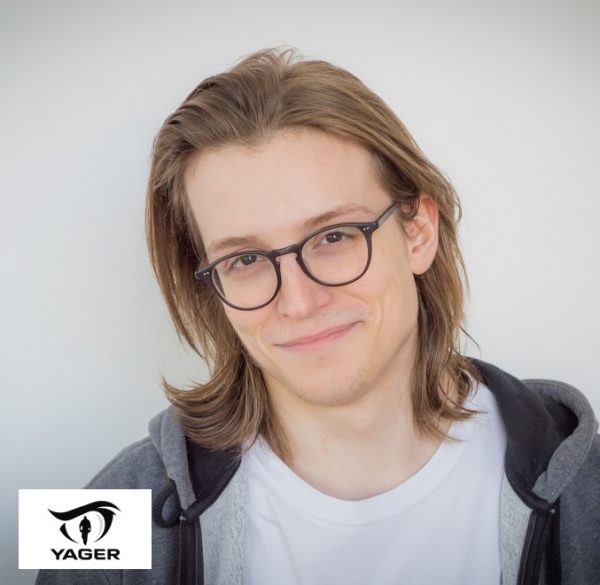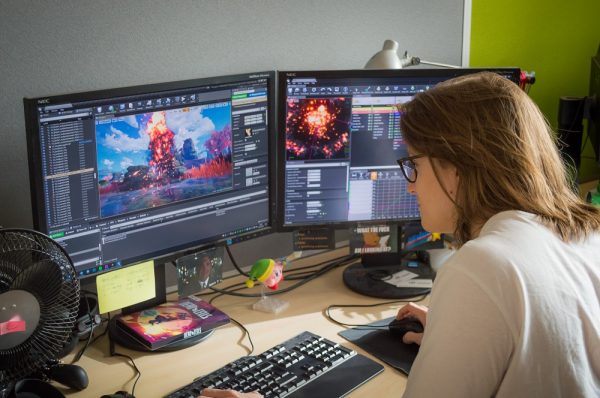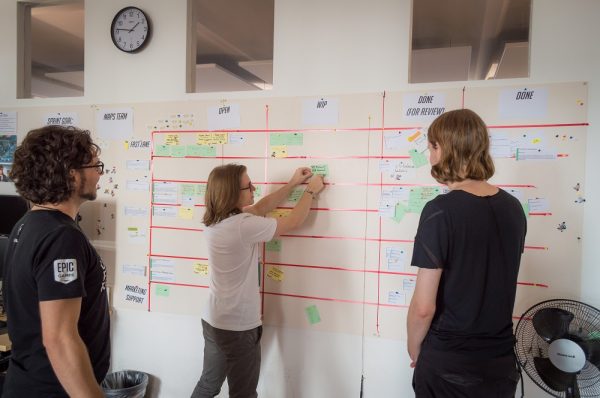
Nico Teetz, VFX Artist at YAGER Development
Games-Career: What is the job of a VFX Artist?
Nico Teetz: The job of a visual effects artist, specifically in game development, revolves around the creation of visual elements, which communicate gameplay features or are embedded into other areas of the game, such as environment or character art. The most popular effect that comes to mind for many people is, of course, an explosion. But effects can take other shapes and forms, for example water surfaces, rain, electricity, light beams, magical spells, energy barriers, sci-fi grenades, fire, smoke, destruction and much more. Since our work often has dependencies on other departments, we need to work closely with artists and programmers of other disciplines to ensure functioning, maintainable and high-quality results.
Games-Career: What typical activities do you perform?

The bigger the explosion – the bigger the pleasure? Getting to create those, is the fun part of the job!
Nico Teetz: Visual effects artists work in many different software applications and tackle many different tasks. In my case, a large part of the work is done in Unreal Engine, where I create particle systems, shaders and blueprint scripts. This requires work with particle dynamics, vector math for shaders and quite basic programming knowledge for blueprint scripting. And while it happens less often than working in Unreal, I do also work in external 3D programs, such as 3ds Max. This is because I need 3D meshes (e.g. cylinders, planes etc.) with specialized UVs (texture coordinates) or vertex colors on a regular basis. Another reason is that certain effects, such as fire, smoke or water, might require fluid simulation, a process in which the real-world behavior of these effects is simulated by the 3D program and can then be exported into the game engine. Additionally, for me, Adobe Photoshop and After Effects are very important to the process. They can however be exchanged for other programs such as Substance Designer. I use them to create the textures that are utilized in my effects. Often these are tileable noise textures, masks or normal-maps, which are used in shaders (surface materials). While it depends on the way these textures are used, often they are essential to give many of my effects a more unique look. At other times textures might just be used as a data-storage of vectors. This can be very helpful, since vector math is essential for creating shaders. Actually, a lot of my job is also about creating an illusion of something. That transparent water you’re standing in might not actually be transparent at all, it just looks like it! The debris you see when a rock breaks apart might not actually be 3D, but just a plane with an image of debris on it. Saw some clouds in a game? More often than not they are also just planes with no volume at all, and the way they interact with light stems from rather complex mathematical equations in the shader, which is applied to that plane. If you pay attention, you might be able to spot these “fakes”. They are often good enough that you don’t notice them during a regular playthrough, but with a more trained eye you can spot them if you pay attention to it. You might ask: “Why go through all this pain?” – and that is indeed a good question. In films, for example, less of this needs to happen because they don’t have to deal with all the limitations that games have to deal with. In games, on the other hand, I could easily use up all the processing power your graphics card has to offer with some fancy new effects, so I need to carefully choose which techniques I make use of in my daily work. Finally, I have to constantly communicate with the rest of my team about what I am doing, or what I require of them to finish my work. For example, I might need the support of a programmer to implement a certain functionality to our characters to give me the ability to play an effect when a footstep happens, so I can then use this functionality in my daily work. Or in another case I might need to sync with our level artist to make sure the environmental effect I’m creating fits to the level we’re making. Games-Career: How do you become a VFX Artist? Nico Teetz: I studied at the SAE Institute Cologne, which gave me the basics of Game Art and a platform to meet other students that I could work with. These friendships helped me focus on my studies, because you’re having more fun and therefore end up pushing each other with team projects. In the end a lot of learning about VFX is just personal interest and self-education. There are loads of tutorials out there on YouTube and Vimeo. While it is sometimes hard to find these resources for VFX specifically, they are out there. By the way, I’d like to give a shoutout to the Real-Time VFX community. They now have a thriving website with a forum to ask for help, or contests you can enter in order to push yourself. Many industry veterans hang out there and if you’re interested in VFX, specifically for games, I strongly encourage you to check out https://realtimevfx.com/. Lastly, I’d like to mention that joining game jams is a great idea as well, not just to get some practice in making effects for an actual project, but also to make connections with other people in the industry. Additionally, you can learn from the assets published on Unreal Engine’s or Unity’s marketplace. In my opinion it’s a great way to get started. You can just dig through the effects and get some time with the actual files behind a VFX reel you might have seen somewhere. Just open them up in the engine and look at how they did it. It helps a lot to have someone to talk to when trying to understand the assets that they made, so if you can, try to reach out to them via e-mail. Finally, know about vector math and basic programming. It’s often underestimated how helpful this really is when making effects. Understanding shaders and scripts is very valuable when trying to learn from the material on the internet and later on there is basically no way around knowing about these things, not even if you’re aiming at handpainted effects, I’d say.
Games-Career: How long does it take to become a VFX Artist?
Nico Teetz: I would say this depends on how much time you put in every day and how much previous knowledge you have. Having worked with Photoshop and some kind of 3D program is a good starting point. If you’ve learned about all the different aspects of game art before, with little-to-no engine experience, then if you really focus on it my estimate is about a year to land a VFX internship somewhere.
Games-Career: What are the sunny sides of the job?
Nico Teetz: Well, you do get to make explosions. That’s pretty awesome :). Also I generally enjoy that visual effects consist of so many different things that there is always something new to learn. You can really specialize for years in certain parts of it, like e.g. fluid simulations or destruction, or you can hop between the topics and become experienced in many different ones.
Games-Career: What are the dark sides of the job?

To achieve functional high quality results, VFX Artists have to constantly communicate and sync with the rest of the team – not always easy when deadlines are tight…
Nico Teetz: The day-to-day work does get a bit hard sometimes, especially when deadlines become tighter. Not because you’ll have to do overtime, but because of how many people you have to talk to, to make sure that your effects work well. And if these people are very busy, whatever you need them to do might not be their highest priority at that time. So making sure that you get what you need from everyone in the development team can be a bit of a pain.
Games-Career: What career prospects does a VFX Artist have?
Nico Teetz: The career path is quite straight-forward, you get promotions based on your experience and skill. Mostly it is “climbing up the ladder”. Additionally, you might be able to crossover to the film industry if you are specialized enough in topics like fluid simulation or destruction. I wouldn’t say this is easy though, and might require different education and contacts to really make the jump if you wanted to.
Games-Career: Thank you for this impressivly detailed insight into your job! A perfect overview to make others understand, what VFX is all about and help them decide if becoming a VFX Artist themselves, could be an option. We highly appreciate this, Nico! Interested in working at YAGER development yourself? Find all recent job opportunities on the company profile.
[newsletter]Deutsch

